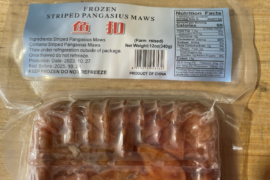The Government of Thailand and the country’s fisheries and frozen food processing industries continue to work together closely to further implement Good Labor Practices (GLP) initiatives throughout the seafood trade. Representatives from the Southeast Asian nation’s public and private sectors recently presented a seminar in Boston to assure importers of its shrimp and fishery products that all efforts are being made to enforce measures to prevent illegal child labor abuses and forced labor practices, and to promote better working conditions.
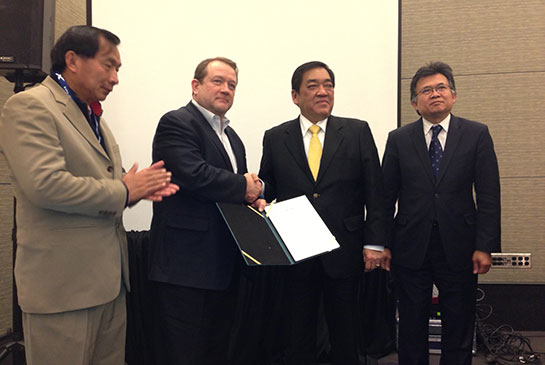 Representatives of the Thai government, seafood catching, processing and aquaculture industries, and the US National Fisheries Institute reaffirm their commitment to assure that farmed shrimp and fishery products exported from Thailand have been produced by companies adhering to Good Labor Practices that include prohibition of child workers and forced labor. Meeting in Boston to discuss progress that has been made in this regard are (left to right) Niwat Sutemechaikul , director general of the Thai Department of Fisheries; John Connelly, president of the NFI; Dr. Poj Aramwattananont, chairman of the Labor and Human Resource Committee of the Thai Chamber of Commerce; and Saroj Thanasunti, deputy chief of mission of the Royal Thai Embassy in Washington, DC.
Representatives of the Thai government, seafood catching, processing and aquaculture industries, and the US National Fisheries Institute reaffirm their commitment to assure that farmed shrimp and fishery products exported from Thailand have been produced by companies adhering to Good Labor Practices that include prohibition of child workers and forced labor. Meeting in Boston to discuss progress that has been made in this regard are (left to right) Niwat Sutemechaikul , director general of the Thai Department of Fisheries; John Connelly, president of the NFI; Dr. Poj Aramwattananont, chairman of the Labor and Human Resource Committee of the Thai Chamber of Commerce; and Saroj Thanasunti, deputy chief of mission of the Royal Thai Embassy in Washington, DC.
“We are committed to bring an end to human trafficking and child labor. We fully understand the problem, which is why we have made it a top priority. We want US consumers to feel confident about buying Thai seafood products,” said Saroj Thanasunti, deputy chief of mission of the Royal Thai Embassy in Washington, as he opened a two-hour discussion on the subject. The in-depth seminar took place during the second day of Seafood Expo North America, which attracted more than 19,000 visitors over a three-day period.
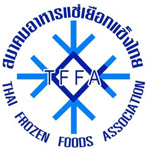 Among panelists assembled to address labor issues were Dr. Panisuan Jamnarnwej, president emeritus of the Thai Frozen Foods Association (TFFA); Dr. Chanintr Chalisarapong, president of the Thai Tuna Industry Association (TTIA); and Dr. Poj Aramwattananont, chairman of Thai Chamber of Commerce’s Labor and Human Resource Committee and honorary president of the TFFA.
Among panelists assembled to address labor issues were Dr. Panisuan Jamnarnwej, president emeritus of the Thai Frozen Foods Association (TFFA); Dr. Chanintr Chalisarapong, president of the Thai Tuna Industry Association (TTIA); and Dr. Poj Aramwattananont, chairman of Thai Chamber of Commerce’s Labor and Human Resource Committee and honorary president of the TFFA.
“The elimination of child labor was easy, because none of our members would dare do so [engage in the practice],” said Dr. Panisuan. Noting that seafood processors and exporters account for most of the companies in the approximately 200-member trade group, he pointed out that the association has worked with the US National Fisheries Institute (NFI) to assure that shrimp and other fishery products shipped to American importers from TFFA members have been produced in total compliance with the GLP program.
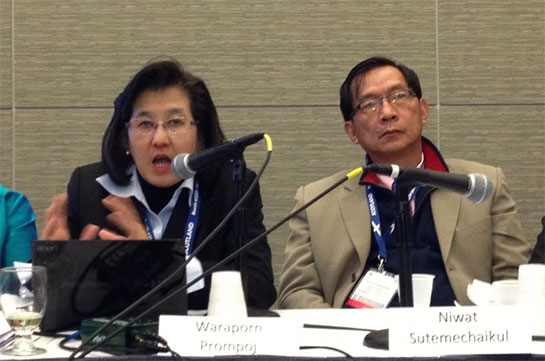 “No to child labor, no to forced labor and no to trafficking in persons!” These are the first three steps of a 10-point Good Labor Practices program set up to create better work places, as outlined by Dr. Waraporn Prompoj, senior expert on International Fisheries Affairs of Thailand’s Department of Fisheries. At her side is Niwat Sutemechaikul, the department’s director general.
“No to child labor, no to forced labor and no to trafficking in persons!” These are the first three steps of a 10-point Good Labor Practices program set up to create better work places, as outlined by Dr. Waraporn Prompoj, senior expert on International Fisheries Affairs of Thailand’s Department of Fisheries. At her side is Niwat Sutemechaikul, the department’s director general.
Selling seafood is big business for Thailand, which ranks as the world’s third largest exporter of fishery products after China and Norway. Exports of approximately 1.9 million tons of farmed shrimp, tilapia, tuna and other fish generated more than $8.8 billion in sales during 2012. As much as 85% of total shrimp production is typically exported.
The United States, which has historically been Thailand’s largest overseas market for seafood, bought approximately $1.2 billion worth of shrimp and prawns (primarily frozen) in 2012, and $594 worth of tuna (mainly canned). Keeping the pipeline open for such products is just as important for importers as it is for exporters.
“Ninety-nine percent of the shrimp Americans eat is imported,” according to Brian Wynn, who serves on the NFI’s executive committee and is the chief executive officer of Rubicon Resources, a Culver City, California-based importer and distributor of seafood.
“We know you are working to address this issue and have made progress. American importers have a proven track record too and our credibility is second to none,” Wynn said before adding that they would never knowingly do business with companies engaged in child labor exploitation or human trafficking violations.
While self policing to make sure underage minors are not employed at TFFA processing plants is relatively easy, assuring that migrant workers are not on the job illegally, or that raw materials have not been sourced from fishing vessels utilizing forced labor, can be much more problematic in an industry that employs upwards of two million people during peak production periods. Nonetheless, the association is constantly striving to assure that its workforce meets all legal requirements.
On the tuna front, Thailand imports about 800,000 metric tons of this fish to process for re-export. Most of it is sourced from the Pacific and Indian Oceans.
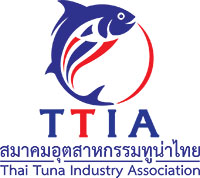 “In the Pacific we buy from Japanese, Korean, Taiwanese and US boats, while in the Indian Ocean the sourcing is mainly from Spanish and French boats,” said TTIA President Chanintr. “There are 18 members in our association, and no plants employ underage workers. Our industry cooperates not only with the government about labor matters, but also with NGOs such as Earth Island.”
“In the Pacific we buy from Japanese, Korean, Taiwanese and US boats, while in the Indian Ocean the sourcing is mainly from Spanish and French boats,” said TTIA President Chanintr. “There are 18 members in our association, and no plants employ underage workers. Our industry cooperates not only with the government about labor matters, but also with NGOs such as Earth Island.”
The US State Department, which publishes an annual Trafficking in Persons Report (TIP), has placed Thailand on a Tier 2 Watch List the past several years, in part because of alleged exploitation of Burmese, Cambodian, Laotian and other nationals said to be working without contracts on Thai-flagged fishing boats. Tier 2 countries are defined as those whose governments do not fully comply with minimum standards of the Trafficking Victims Protection Act, but who are making significant efforts to bring themselves into compliance.
Should Thailand’s status slip to Tier 3 because of lack of progress in combating human trafficking, imports of Thai seafood products into the US could be dramatically reduced by the imposition of stringent non-tariff barriers.
Niwat Sutemechaikul, director general of Thailand’s Department of Fisheries, assured those attending the Boston seminar that much progress in anti-human trafficking in the fisheries sector has been made since a national strategy to eliminate the problem was implemented. The effort involves cooperation among numerous public organizations, private agencies and non-government organizations (NGOs) including the Ministry of Labor, Department of Fisheries, Royal Thai Navy, Thai Frozen Food Association and Labor Rights Promotion Network Foundation.
Dr. Waraporn Prompoj, the Department of Fisheries senior expert on international fisheries affairs, pointed out that the Good Labor Practices campaign was officially launched last September across all channels of seafood production – from fishing vessels and shrimp farms to primary processing stations and value-added production plants. Among its provisions are strict workplace protection measures and labor inspection programs.
“Efforts of the Thai government in working with various private sectors and NGOs, with technical support by the International Labor Organization and other regional and international agencies, ensure that Thailand has committed national policies and implementation to seriously tackle labor issues in promoting better working conditions in fishing, shrimp and seafood processing industries,” said Dr. Waraporn.
Dr. Poj Aramwattananont, chairman of the Thai Chamber of Commerce’s Labor and Human Resource Committee, said that a shortage of domestic workers in the fish catching and seafood processing sector has made it necessary to increasingly employ migrant workers. As such, the Thai Ministry of Labor has established Labor Coordination Centers for the fishing industry in seven coastal provinces covering operations in 22 provinces. Memos of understanding have been drafted to recruit documented labor from Cambodia, Laos, Vietnam, Bangladesh and Myanmar.
Meanwhile, seafood processors in Thailand insist that they are doing their utmost to conform to labor regulations and make sure that only legal workers enjoying fair employment practices staff their factories.
Dr. Panisuan, TFFA’s president emeritus, made it clear that any members of the association found to be exploiting illegal migrant workers will be dealt with accordingly. “Such behavior will be regarded as cheating on fellow members, and the result will be that they will be expelled from the group,” he stated.
Expulsion and removal from the TFFA’s list of companies that are in compliance with the GLP program would make it all but impossible for importer and distributor members of the National Fisheries Institute in the United States to continue doing business with such parties. – JMS




